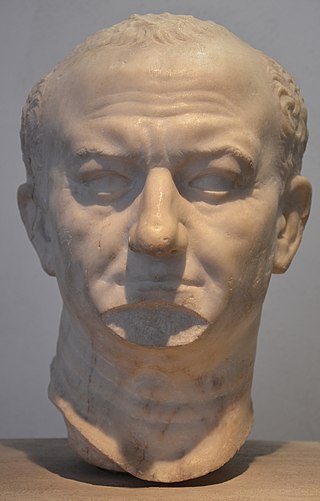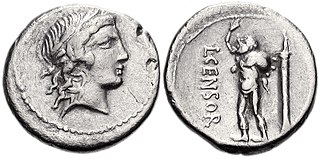Related Research Articles

Around the start of the Common Era, the family trees of the gens Julia and the gens Claudia became intertwined into the Julio-Claudian family tree as a result of marriages and adoptions.

The gens Valeria was a patrician family at ancient Rome, prominent from the very beginning of the Republic to the latest period of the Empire. Publius Valerius Poplicola was one of the consuls in 509 BC, the year that saw the overthrow of the Tarquins, and the members of his family were among the most celebrated statesmen and generals at the beginning of the Republic. Over the next ten centuries, few gentes produced as many distinguished men, and at every period the name of Valerius was constantly to be found in the lists of annual magistrates, and held in the highest honour. Several of the emperors claimed descent from the Valerii, whose name they bore as part of their official nomenclature.

The gens Aurelia was a plebeian family at ancient Rome, which flourished from the third century BC to the latest period of the Empire. The first of the Aurelian gens to obtain the consulship was Gaius Aurelius Cotta in 252 BC. From then to the end of the Republic, the Aurelii supplied many distinguished statesmen, before entering a period of relative obscurity under the early emperors. In the latter part of the first century, a family of the Aurelii rose to prominence, obtaining patrician status, and eventually the throne itself. A series of emperors belonged to this family, through birth or adoption, including Marcus Aurelius and the members of the Severan dynasty.

The gens Flavia was a plebeian family at ancient Rome. Its members are first mentioned during the last three centuries of the Republic. The first of the Flavii to achieve prominence was Marcus Flavius, tribune of the plebs in 327 and 323 BC; however, no Flavius attained the consulship until Gaius Flavius Fimbria in 104 BC. The gens became illustrious during the first century AD, when the family of the Flavii Sabini claimed the imperial dignity.

Gaius Octavius was a Roman politician. He was an ancestor to the Roman emperors of the Julio-Claudian dynasty. He was the biological father of the emperor Augustus, step-grandfather of the emperor Tiberius, great-grandfather of the emperor Claudius, and great-great grandfather of the emperors Caligula and Nero. Hailing from Velitrae, he was a descendant of an old and wealthy equestrian branch of the plebeian gens Octavia. Not being of senatorial rank, he was a novus homo at Rome. His grandfather, Gaius Octavius, fought as a military tribune in Sicily during the Second Punic War. His father, Gaius Octavius, was a municipal magistrate who lived to an advanced age.

The gens Pompeia was a plebeian family at ancient Rome, first appearing in history during the second century BC, and frequently occupying the highest offices of the Roman state from then until imperial times. The first of the Pompeii to obtain the consulship was Quintus Pompeius in 141 BC, but by far the most illustrious of the gens was Gnaeus Pompeius, surnamed Magnus, a distinguished general under the dictator Sulla, who became a member of the First Triumvirate, together with Caesar and Crassus. After the death of Crassus, the rivalry between Caesar and Pompeius led to the Civil War, one of the defining events of the final years of the Roman Republic.

The gens Marcia, occasionally written Martia, was one of the oldest and noblest houses at ancient Rome. They claimed descent from the second and fourth Roman Kings, and the first of the Marcii appearing in the history of the Republic would seem to have been patrician; but all of the families of the Marcii known in the later Republic were plebeian. The first to obtain the consulship was Gaius Marcius Rutilus in 357 BC, only a few years after the passage of the lex Licinia Sextia opened this office to the plebeians.
The gens Popillia, sometimes written Popilia, was a plebeian family in Rome. The first of the Popillii to obtain the consulship was Marcus Popillius Laenas in 359 BC, only eight years after the lex Licinia Sextia opened that magistracy to the plebeians.
Gaius Julius Alexander Berenicianus was a Cilician Prince and second-born son to King Gaius Julius Alexander and Queen Julia Iotapa of Cetis. His eldest brother was Gaius Julius Agrippa and his younger sister was Julia Iotapa.
Julia was a Herodian Princess who lived in the 1st century and possibly in the 2nd century in the Roman Empire.

Marcius Censorinus was a name used by a branch of the plebeian gens Marcia of ancient Rome. The cognomen Censorinus was acquired through Gaius Marcius Rutilus, the first plebeian censor, whose son used it. The gens Marcia claimed descent from both Ancus Marcius, a king of Rome, and symbolically from Marsyas the satyr, who was associated with free speech and political liberty; see further discussion at Prophecy and free speech at Rome. The Marcii Censorini were consistent populares, supporting Marius, Cinna, Julius Caesar, and Antonius.
The gens Asinia was a plebeian family at ancient Rome, which rose to prominence during the first century BC. The first member of this gens mentioned in history is Herius Asinius, commander of the Marrucini during the Social War. The Asinii probably obtained Roman citizenship in the aftermath of this conflict, as they are mentioned at Rome within a generation, and Gaius Asinius Pollio obtained the consulship in 40 BC.

Tiberius Julius Celsus Polemaeanus, commonly known as Celsus, was an Ancient Greek military commander and politician of the Roman Empire who became a senator, and served as suffect consul as the colleague of Lucius Stertinius Avitus. Celsus Polemaeanus was a wealthy and popular citizen and benefactor of Ephesus, and was buried in a sarcophagus beneath the famous Library of Celsus, which was built as a mausoleum in his honor by his son Tiberius Julius Aquila Polemaeanus.
Gaius Antius Aulus Julius Quadratus was a Roman senator from Pergamon, who was appointed consul twice, in AD 94 and then in AD 105, the first senator from the Eastern Mediterranean to achieve the ordinary consulship.

The gens Fonteia was a plebeian family at ancient Rome. Members of this gens are first mentioned toward the end of the third century BC; Titus Fonteius was a legate of Publius Cornelius Scipio during the Second Punic War. The first of the Fonteii to obtain the consulship was Gaius Fonteius Capito, consul suffectus in 33 BC.

The gens Nonia was a plebeian family at ancient Rome. Its members first appear in history toward the end of the Republic. The first of the Nonii to obtain the consulship was Lucius Nonius Asprenas in 36 BC. From then until the end of the fourth century, they regularly held the highest offices of the Roman state.
Tiberius Julius Candidus Marius Celsus was a Roman senator who lived during the Flavian dynasty. Contemporary sources, such as the Fasti Ostienses, the Acta Arvalia and a letter of Pliny the Younger, refer to him as Tiberius Julius Candidus. He was twice consul.

Quintus Julius Cordinus Gaius Rutilius Gallicus was a Roman senator who held several posts in the emperor's service. He was twice suffect consul: for the first time in the nundinium of September to October 70 AD; and the second time in 85 with Lucius Valerius Catullus Messalinus as his colleague, succeeding the Emperor Domitian.
Gaius Fonteius Capito was a Roman senator during the Principate. He served as ordinary consul as the colleague of Germanicus in AD 12, and later as proconsul of Asia.
The gens Statia was a minor plebeian family at ancient Rome. Members of this gens are first mentioned in the early decades of the Republic, but the name does not appear again in history until the time of Cicero. The Statii remained relatively undistinguished until the reign of Trajan, when Lucius Statius Aquila was raised to the consulship.